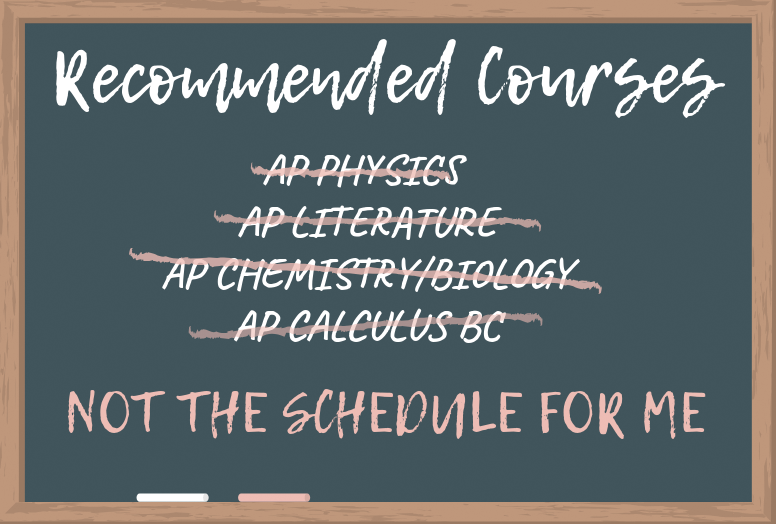Pursue passions, not recommendations
A senior reflects on her experiences taking an untraditional course load
High school is often painted with a sense of freedom. Teens are told to look forward to the ability to drive, to pursue their dreams in college and to dive into new passions over the four glorified years.
There is some legitimacy to this feeling of independence associated with high school. Faced with a vast array of extracurricular activities and course options, high schoolers are provided a lot of choice and room to explore their interests. Yet, these choices can come at a price.
I dreaded picking my classes each January. Every winter break like clockwork, I would ponder the course catalog for the next year and find myself conflicted considering all of the possibilities if I deviated from my teachers’ recommendations. Often bringing myself to tears, I was overwhelmed by the scope of possible classes, and yet the narrow options that felt reasonable to actually pursue.
I packed my schedule with core classes, band, Spanish, and physical education. Yet, I couldn’t help but consider the opportunities I would have if I deviated from this path. What if I took early bird physical education? What if I dropped band to try art or writing? What if I ignored the messages colleges drilled into my head telling me that I need four years of every core class and, instead, pursued my interests?
I felt a pressure to enroll in my recommended courses. This pressure stemmed from my own perceived image of a successful student at VHHS, but that image was undoubtedly reinforced by my environment — counselors’ advice, classmates’ course loads and colleges’ admissions guidelines.
After two years of regretting decisions and following my prescribed path, I decided it was time to truly pursue these other options. I found myself in a unique situation where I was no longer able to take physical education or band, and I suddenly had room in my schedule.
That January, rather than registering for physics, band or physical education as I was expected to, I took an alternative path. I enrolled in human physiology, AP seminar and journalism. Registering for these courses, I found myself excited for the next year. Not only would I be taking classes that truly interested me, but I would also be trying out an AP class in the first year it was offered.
Starting school August of my junior year, I dreaded school less and found myself excited to attend my classes. My grades were higher than they had ever been, and I realized that it was not a coincidence. Because I was in classes that I loved, I retained information better and finished homework faster.
Teachers and peers cautioned me that this purposeful choice could hurt me in the long-run. It was possible that the colleges I applied to would have expected physics instead of human physiology. I was warned that schools may believe I wasn’t challenging myself enough. While I undoubtedly ran into obstacles in my application process, my course load was still rigorous and served as more of a benefit than a hindrance to my success.
Numerous colleges I applied to required additional information and interviews in their admissions processes. Walking into those situations, I was always consumed by fear that my course load would be questioned or cause interviewers to not take me as seriously as an applicant. I was pleasantly surprised to find that instead of belittling my choices, my unique schedule served as a conversation starter.
When I was asked about classes I loved and classes I hated, I was able to explain how I pursued my passions junior and senior year. Since I disliked traditional sciences, I was able to attest to my love for human physiology and AP environmental science. My admissions interviewers appreciated the thought and energy that I had poured into these decisions. Some even noted that they wished they had pursued a more unique path in high school.
Enrolling in a unique course load is not for everyone. There is certainly a sense of community that comes in the majority of the junior class taking physics or seniors friends suffering through AP literature together that I missed out on. However, for me, taking an nontraditional route was critical to developing a sense of independence, discovering my interests and learning more about myself along the way.
Next fall, as a freshman in college, I plan to continue taking my nontraditional course load. My university’s honors program equips me with the resources to take interdisciplinary seminars instead of general education credits. As someone who aims to major in journalism and international relations with the goal of creating tangible change in the world, this is crucial to my continued education. I need to learn how to think critically and for myself, rather than receiving training on how to think. And, with the resources and support that VHHS and my counselor have provided me in pursuing my unique schedule, I have no doubt that I am prepared for this even-more-unique curriculum next fall.

